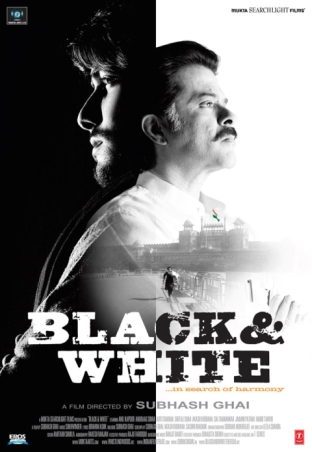
 |
 2008 is a very important year for Subhash Ghai, the once was Showman of Indian Cinema. His latter films like Yaadein and Kisna have left critics scratching their heads and audiences fleeing for their lives. What happened to this master storyteller of greats like Khalnayak, Pardes, and Taal? With a pair of biggies in BLACK & WHITE and YUVRAAJ, 2008 may very well be Ghai's final gasp - for it may just give him a new lease on life, or perhaps his last great Hurrah! 2008 is a very important year for Subhash Ghai, the once was Showman of Indian Cinema. His latter films like Yaadein and Kisna have left critics scratching their heads and audiences fleeing for their lives. What happened to this master storyteller of greats like Khalnayak, Pardes, and Taal? With a pair of biggies in BLACK & WHITE and YUVRAAJ, 2008 may very well be Ghai's final gasp - for it may just give him a new lease on life, or perhaps his last great Hurrah!
But for the purpose of this review, we'll take a look into the music of BLACK & WHITE, a film that promises to be anything but ordinary. The man behind the music is veteran Sukhwinder Singh, who has already composed for tracks in HALLA BOL and BOMBAY TO BANGKOK this year. Unfortunately, one thing must be said - the man's talents clearly fall within the realm of singing, not composing. God willing, B&W's soundtrack will prove me wrong. The lyrical sidekick for tonight's featured journey is long-time writer Ibrahim Ashq. Haq Allah starts us off with two distinctively different versions by the same name. While the first is constructed with a swift rhythm comprising of mainly eastern instruments, including dhol, table, harmonium etc.; the second is about three times as fast paced and lacks any melodic or instrumental value. Sukhi is unable to provide any creative injections that would lead us back to this monotonous composition in the near or distant future. Renditions by Sukhwinder Singh and Hans Raj Hans are average. Ashq's lyrics play a very small role amongst all the cacophony. Verdict: Another dud composed by the faltering MD. Jogi Aaya enters with a thrust of freshness, thanks to Sukhwinder Singh and Sadhna Sargam - Yes, SADHNA SARGAM! The lady with the golden voice, who is heard so infrequently these past few years, comes up with another winner to add to her stunning resume. As much as Sargam adds to this number, it is Singh who deserves all the accolades for an unconventional harmony, which incorporates sounds of sitar, string, and drums to make a very pleasing composition upon which the credit-worthy melody slithers away. Serving as some sort of an adjoining bond between the male and female lead vocalists is the female chorus, which gracefully chants the title line Jogi Aaya. Ashq completes the musical trinity with his authentically romantic phrasing and poetry. Verdict: Although it may not go down as one of the year's best, it definitely is one of Singh's best compositions and deserves a spot on your playlist, if even for just a little while.
Main Chali, as you probably have guessed, is the female version of the previous track, rendered by Shreya Ghoshal. Sukhi infuses more energy and animation into this version's rhythm, and Shreya's vocals suit the aura of the genre much more than did Sukhi's vocals. However, that being said - the track itself still lacks the soul. There is no chemistry between melody and harmony, and this is why the song fails. Let's just move on... Peer Manavan is a fun track full of mauj masti. Built with a strong dholak base, the number takes off with a flying melody and some rich and animated vocals by Sukhwinder Singh and Shraddha Pandit. Upon Pandit's entrance, you're shocked by her rugged and unconventional voice, but soon realize that it's just what the doctor ordered for such an entertainingly festive number. Sukhwinder Singh has tended to falter with this genre of song in the past, so it's great to see him jump the hump finally! Verdict: It's sure to have you shaking a leg in no time (even more so with the remix version). Udit Narayan makes a cameo with Ye Hindustan Hai. The way the melody has been composed, it sounds like a hypnotic chant that's trying to get into your head. Maybe it's me, but I just couldn't find myself enjoying the music, as it all seemed so rehearsed. The chorus lines were lacking the punch we heard so effectively in Jogi Aaya. Narayan's rendition is average. The second version, rendered by Jagjit Singh, is more of the same, but treated by Sukhi as an acoustic ghazal. In fact, the ghazal version by Jagjit Singh is a little bit more enjoyable, since it stays within its genre and doesn't try to force itself on you like the original. Verdict: Although nothing special at all, give Jagjit Singh's version a little time to see if it grows on you (if you are into the ghazal genre).
Aakash Gandhi is Managing Editor and Senior Writer for Planetbollywood.com. He also freelances for the Asian Variety Show at avstv.com.
|
|||||||||||||||||||||
| Comments | Contact Us | Advertise | Terms of Service | Privacy Policy |